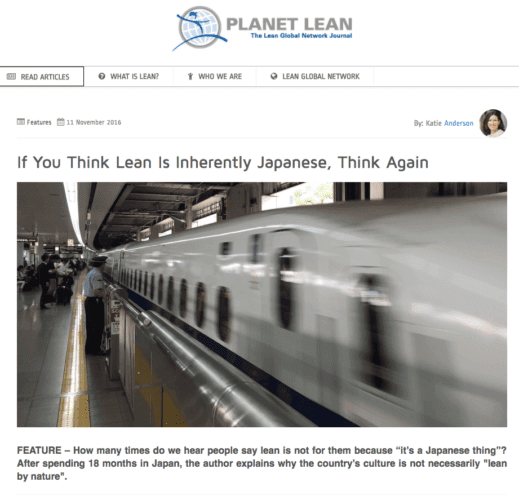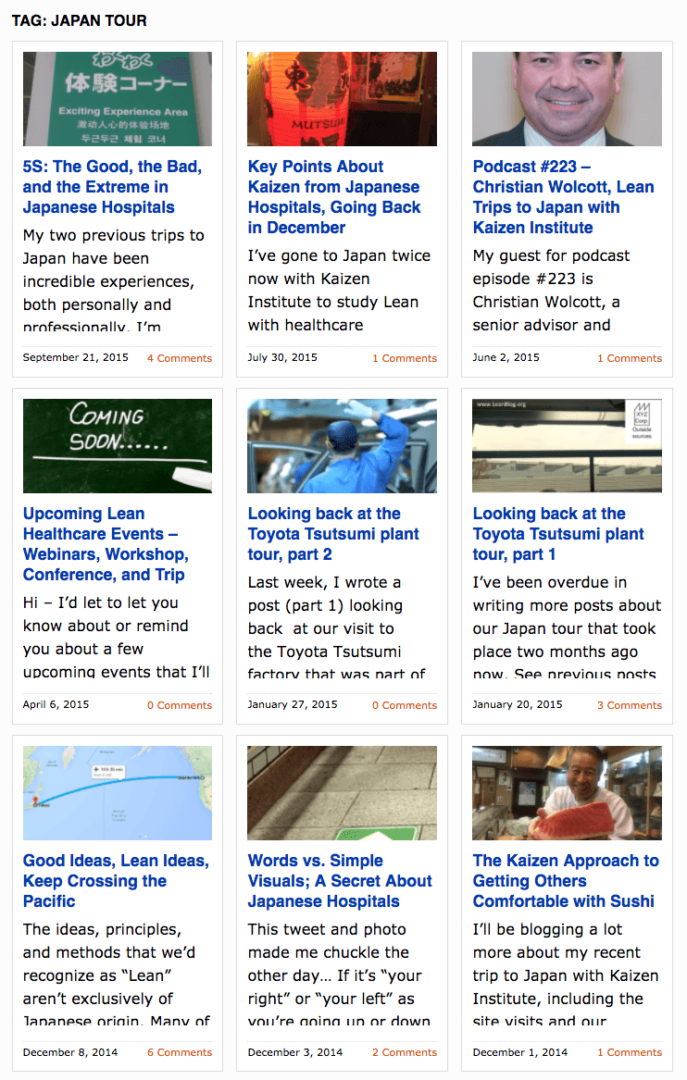Facebook is reminding me that it was four years ago this week that I made my initial study trip to Japan with Kaizen Institute… and my return trip was two years ago this week. I'd love to go back in 2017.
I have so many great memories from those trips and I learned a lot.
One thing I learned and wrote about was the idea that “Toyota Culture” or “Lean Culture” are not exactly the same thing as “Japanese Culture” – in terms of national culture or the typical organizational culture in a Japanese business.
Katie Anderson, who I interviewed in my Podcast series, recently wrote an article for Planet Lean with her reflections from actually getting to live in Japan:
As her article starts:
“The main theme that has emerged from my reflection is that Japanese culture does not equal Toyota culture. What we call “lean” is not inherently easy for the Japanese and there are cultural traits that both enable and inhibit the adoption of principles of the Toyota Production System (TPS).”
I also recommend her other blog posts with stories and reflections of what she learned from the perspective of an American who has been practicing Lean in healthcare.
Here is my podcast with her… and we're doing another one in December with more of her reflections now that she's home in California.
Podcast #233 – Katie Anderson, A Lean Thinker Living in Japan
Here is one of my articles on this theme of Lean and the practice of “pulling the andon cord” might not be an easy or natural thing to occur in a Japanese workplace culture. Toyota has had to work hard to create their own culture – one that translates well into North America and other regions where they do business.
Andon Cords at the Toyota Takaota Plant – It Doesn't Come Naturally?
For other posts I've written about Japan, click here or below:
Please scroll down (or click) to post a comment. Connect with me on LinkedIn.
Let’s build a culture of continuous improvement and psychological safety—together. If you're a leader aiming for lasting change (not just more projects), I help organizations:
- Engage people at all levels in sustainable improvement
- Shift from fear of mistakes to learning from them
- Apply Lean thinking in practical, people-centered ways
Interested in coaching or a keynote talk? Let’s talk.
Join me for a Lean Healthcare Accelerator Trip to Japan! Learn More












I remember from Liker and Hoseus’ book Toyota Culture that, among other cultural traits shown in a longitudinal study, two were individualistic vs. collective thinking and short term vs. long term thinking. The Japanese were collective and long term thinkers while Americans were quite less so.
In my 28 years practicing continuous improvement in the U.S. I noted the individualistic and short term thinking quite often, and it definitely was a hindrance. So I’d have to say that based on my casual observation that these traits definitely make practicing lean in the U.S. difficult. Having never been to Japan I can’t draw a comparison but Liker and Hoseus’ study leads me to believe there is somewhat of a cultural advantage to practicing Lean there vs. the U.S.
Thanks for commenting. From my understanding, there are Japanese culture advantages and there are also challenges.
I think you’re right about long-term thinking. And following a routine or standards once taught how to do a job.
But Japan seems to have hierarchy that stifles speaking up and hardly makes Kaizen automatic.
Americans are more willing to speak up, it seems — until taught to keep quiet by their stifling workplaces. And we are stereotypically “cowboys” who want to do things our own way…
But Lean is certainly not the default business system in Japanese companies.
Comments are closed.